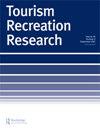Kinmaking: toward more-than-tourism (studies)
IF 2.6
Q1 HOSPITALITY, LEISURE, SPORT & TOURISM
引用次数: 2
Abstract
ABSTRACT The field of tourism studies has entered an epoch of manifold vulnerabilities, a period in which the academic community will have to respond to the environmental and planetary crises and consider the wellbeing of not just humans but also nonhumans and multispecies. In these momentous times, it is imperative not to overlook tourism studies’ ontological, epistemological, and axiological vulnerabilities and to survey the potential viabilities. Although the blossoming criticalities in the field have greatly fuelled the urgency to correct, rectify, and recalibrate existing relational arrangements and replace these by more sustainable, just, and inclusive visions for/versions of tourism, there is still a pressing need for more conceptually, theoretically, and philosophically malleable architecture. Inspired by Donna Haraway’s scholarship on broader planetary matters, this contribution offers ‘kinmaking’ as a critico-creative, disruptive space and fitting thoughtscape for transitioning into more-than-tourism (studies). Among the key ideas covered in this paper are the dangers of epistemocentricism, the necessity for sympoietic approaches, the rise of postdisciplinary and posthuman acumen, and the overall ripeness of tourism studies to become a domain of critical relationalities.亲属关系:超越旅游(研究)
旅游研究领域已经进入了一个多重脆弱性的时代,在这个时代,学术界将不得不应对环境和地球危机,不仅要考虑人类的福祉,还要考虑非人类和多物种的福祉。在这个重要的时代,当务之急是不要忽视旅游研究的本体论、认识论和价值论的脆弱性,并调查潜在的可行性。尽管该领域不断涌现的批评极大地推动了纠正、纠正和重新校准现有关系安排的紧迫性,并以更可持续、更公正、更包容的旅游愿景/版本取代这些安排,但仍然迫切需要更多概念、理论和哲学上具有延展性的架构。受Donna Haraway关于更广泛的行星问题的奖学金的启发,这一贡献提供了“亲属关系”作为一个批判性的创造性,破坏性的空间和适合的思想景观,以过渡到不仅仅是旅游(研究)。本文涵盖的主要观点包括:认识中心主义的危险、同义论方法的必要性、后学科和后人类智慧的兴起,以及旅游研究成为批判性关系领域的全面成熟。
本文章由计算机程序翻译,如有差异,请以英文原文为准。
求助全文
约1分钟内获得全文
求助全文
来源期刊

Tourism Recreation Research
HOSPITALITY, LEISURE, SPORT & TOURISM-
CiteScore
11.30
自引率
7.10%
发文量
77
期刊介绍:
Tourism Recreation Research is a multidisciplinary international journal now published quarterly; it focuses on research problems in various tourism and recreational environments — ecological, economic, and socio-cultural — and attempts to seek solutions for sustainable development. Contributions are also encouraged on fundamental research concepts and theories. The journal carries regular features such as Research Note, Post-Published Reviews and Book Reviews. The ‘Research Note’ provides opportunity for scholars who have attained sufficient maturity to establish reliable findings in their field of research. The ‘Post-Published Review’ section has been introduced to capture deep insights into the papers that have already been published in Tourism Recreation Research to fill in gaps in the received information. Strong emphasis is laid on original research and readable prose.
 求助内容:
求助内容: 应助结果提醒方式:
应助结果提醒方式:


